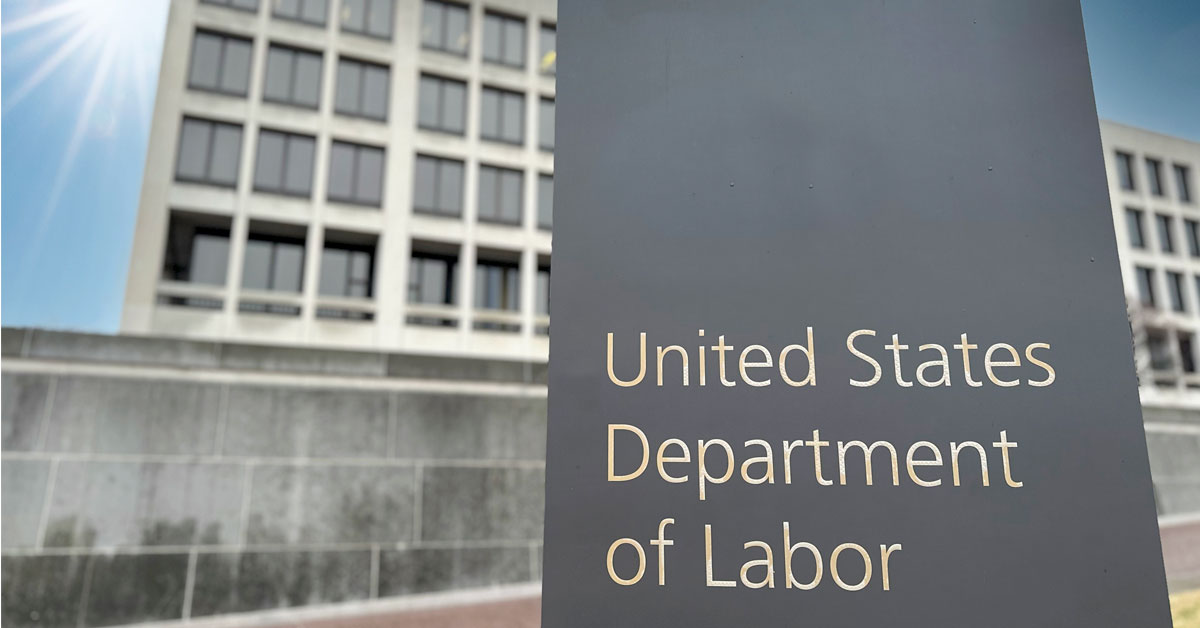The DOL’s final fiduciary rule is here!
[Updated; original publish date 5/21/24] On July 26, 2024, a Texas judge stopped a new rule from the U.S. Department of Labor that was scheduled to go into effect on September 23. The rule would have changed the definition of investment advice fiduciaries for retirement savers. This decision is in effect until further notice and applies nationwide, not just for the people involved in the court case.

The U.S. Department of Labor (DOL) released its new fiduciary investment advice definition on April 23, 2024—Retirement Security Rule: Definition of an Investment Advice Fiduciary (final rule). The final rule amends the existing rule that defines when a person is an investment advice fiduciary under the Employee Retirement Income Security Act of 1974 (ERISA) and the Internal Revenue Code of 1986 (the Code). Included with the final rule were amendments to various class prohibited transaction exemptions (PTEs) available to investment advice fiduciaries.
The DOL made the issuance of a new fiduciary rule a top priority, following a fast-track approach with their latest proposal. The final rule and PTE amendments significantly expand which parties may be considered investment advice fiduciaries under ERISA and the Code. They also impose new and expanded requirements on investment firms and professionals.
Existing fiduciary rule
The final rule replaces the DOL’s five-part test, which was originally issued in 1975. Under the five-part test, individuals are an investment advice fiduciary only if they meet the following five elements:
- Render advice about the value of securities or other property or make recommendations on the advisability of investing in, purchasing, or selling securities or other property
- Provide advice on a regular basis
- Provide advice pursuant to a mutual agreement, arrangement, or understanding with the plan or a plan fiduciary
- Advice serves as a primary basis for investment decisions on plan assets
- Advice is individualized based on the plan’s needs
Reasons behind the rule change
Going back to 2010, the DOL was concerned that the five-part test had become outdated and needed to be refreshed to reflect the current marketplace. The current definition was drafted when IRAs were less common, 401(k) plans didn’t exist, and defined benefit plans were more prevalent. Today, 401(k) plan participants and IRA owners are expected to make important, complex financial decisions and are, therefore, more likely to seek the help of investment advisers. These advisers often hold themselves out as experts who are making individualized investment recommendations that reflect the retirement investor’s best interests.
The DOL believes the final rule better reflects the current marketplace and the intent of ERISA. They also believe it should ensure that when retirement investors entrust their retirement security to investment firms and professionals, their confidence isn’t misplaced, regardless of what investment is recommended. The final rule should also assure that investment firms and professionals are able to compete for business on a level playing field, instead of an unbalanced system that holds advisers to different standards based on their recommended products. For example, investment firms and professionals will now be held to the same fiduciary standard for rollover recommendations.
A previous attempt at a new rule was vacated: The DOL’s concern about the five-part test culminated in the adoption of a new fiduciary rule in 2016 (2016 rule) that expanded the types of investment advice that were subject to ERISA’s fiduciary standards. The 2016 rule was vacated by a decision of the U.S. Court of Appeals for the Fifth Circuit in 2018.
The Department of Labor’s 2024 fiduciary rule
The final rule provides that a person will be an investment advice fiduciary if he or she provides investment advice or makes an investment recommendation to a retirement investor—defined as a plan; a plan fiduciary, participant, or beneficiary; an IRA; or an IRA owner, beneficiary, or fiduciary—for a fee or other compensation, directly or indirectly.
In addition, the person must either:
- Directly or indirectly (e.g., through or together with any affiliate) make professional investment recommendations to investors on a regular basis as part of their business, and the recommendation:
- Is made under circumstances that would indicate to a reasonable investor in like circumstances that the recommendation is based on review of the retirement investor’s particular needs or individual circumstances,
- Reflects the application of professional or expert judgment to the retirement investor’s particular needs or individual circumstances, and
- May be relied on by the retirement investor as intended to advance the retirement investor’s best interest.
Or:
- Represent or acknowledge that he or she is acting as a fiduciary under ERISA with respect to the recommendation.
Unlike the existing fiduciary rule, and consistent with the proposed rule, the final rule eliminates the requirement that advice be provided to the investor “on a regular basis” and pursuant to a mutual agreement, arrangement, or understanding that the investment advice will serve as a primary basis for a retirement investor’s investment decision. Alternatively, the final rule focuses on whether the adviser is a person who makes investment recommendations to investors on a regular basis as part of his or her business. In addition, as was the case under the proposed rule, the final rule noted that one-time advice could be fiduciary in nature.
Differences between the proposed rule and the final rule
Although the final rule is similar to the proposed rule, the DOL made some modifications to the proposed rule and provided some clarifications, mostly to address some of the comments they received on the proposed rule:
- The DOL removed a component of the proposed fiduciary definition whereby a person who rendered investment advice to a retirement investor would be considered a fiduciary if he or she directly or indirectly (e.g., through or together with any affiliate) had discretionary authority or control with respect to purchasing or selling securities or other investment property for a retirement investor.
- The DOL also clarified that with respect to a person who becomes an investment advice fiduciary due to his or her representing or acknowledging that he or she is acting as a fiduciary under ERISA with respect to a recommendation, fiduciary status would apply only with respect to that recommendation and not with respect to every future interaction with the same retirement investor, regardless of the circumstances.
- The final rule confirmed that “sales pitches” and investment education can be provided without resulting in ERISA fiduciary status.
- The DOL added a new definition of “retirement investor,” as defined above.
Amendments to prohibited transaction exemptions
The DOL amended several existing PTEs—2020-02, 84-24 (the QPAM Exemption), 75-1, 77-4, 80-83, 83-1, and 86-128—to make the exemption conditions more uniform and protective. Their intention was to ensure all retirement investors receive the same quality of investment advice, regardless of the product or service they receive.
In particular, among other revisions, the scope of PTE 2020-02 was narrowed to expand the exemption’s disqualification provisions (similar to recent amendments to the QPAM Exemption) and prohibit conditional fiduciary acknowledgements. Similarly, the QPAM Exemption was narrowed to only cover “independent producers” and recommendations with respect to non-securities products.
Investment advice fiduciaries will generally need to rely on two of the amended exemptions, PTE 2020-02 or PTE 84-24, for transactions that would result in compensation that’s otherwise prohibited under ERISA.
As amended, PTE 2020-02 permits otherwise prohibited compensation to be paid to financial institutions and investment professionals as fiduciaries, provided they satisfy certain requirements, including that they:
- Acknowledge their fiduciary status in writing.
- Disclose their services and material conflicts of interest.
- Adhere to certain impartial conduct standards:
- Advice must meet obligations of care and loyalty
- The investment professional and firm must charge no more than reasonable compensation and comply with applicable federal securities laws regarding “best execution”
- The advice must be free from misleading statements about investment transactions and other relevant matters
- Adopt policies and procedures prudently designed to ensure compliance with the impartial conduct standards.
- Mitigate conflicts of interest.
- Document and disclose the reasons for a rollover recommendation and how it’s in the retirement investor’s best interest.
PTE 84-24 allows fiduciaries to receive compensation when plans and IRAs enter into certain insurance and mutual fund transactions recommended by the fiduciary (or its affiliates), as well as certain related transactions. The final amendment covers compensation to “independent producers”—i.e., those who sell insurance products of two or more unrelated insurers—selling annuities or other insurance products not regulated by the SEC; however, this assumes that certain conditions are satisfied, including that the independent producer acknowledges fiduciary status and meets certain disclosure requirements and conduct standards similar to PTE 2020-2.
Initial reactions to the final rule
The proposed rule, issued in October 2023, endured financial industry and Congressional scrutiny, threats of litigation, and approximately 20,000 public comments. Similar to the proposed rule, the final rule has already been met with some criticism. Those opposed feel that the final rule is a rehash of a 2016 rule that was vacated in court, and that it was issued in haste given considerable time was needed to analyze and comment on the proposed rule changes. Another common objection was that the final rule contained elements that are redundant because state insurance regulators and the SEC already regulate the same annuity and rollover transactions, respectively.
Supporters of the final rule point out that retirement investors place trust in their adviser when making decisions on annuity purchases and rollovers and that these decisions aren’t always made in their best interest. The final rule will put the right focus on investment recommendations. In addition, the SEC’s Regulation Best Interest doesn’t apply to plan sponsors because they’re not retail investors. As such, small employers sponsoring a retirement plan are effectively treated as if they were experienced investors, when in most cases, they’re dependent on their adviser’s recommendations.
Effective dates
The final rule and certain amendments to the prohibited transaction exemptions will take effect on September 23, 2024. The amendments for PTE 2020-02 and PTE 84-24 will have an additional one-year transition period where exemptive relief will require a written acknowledgement of fiduciary status and compliance with the impartial conduct standards.
Potential for delay in implementation: This is the DOL’s fourth attempt since 2010 to expand “investment advice status.” Prior attempts were met by either industry challenges or court challenges. Since the final rule is expected to face similar challenges, it’s possible that there will be a delay in the implementation of the final rule and associated PTE amendments.
Resources to help fiduciaries
Retirement plan fiduciaries—we've got a library of fiduciary resources just for you, all in one place to help make your job easier.
Important disclosures
Important disclosures
The content of this document is for general information only and is believed to be accurate and reliable as of the posting date but may be subject to change. It is not intended to provide investment, tax, plan design, or legal advice (unless otherwise indicated). Please consult your own independent advisor as to any investment, tax, or legal statements made.
MGTS-PS 599164 05/24 599164 MGR0729243752833



